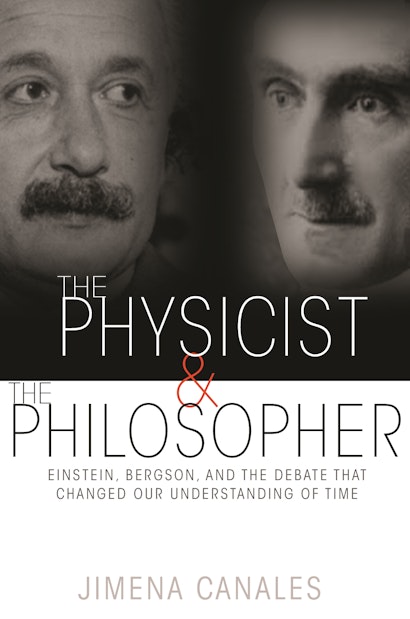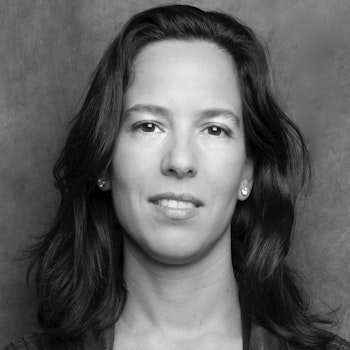On April 6, 1922, in Paris, Albert Einstein and Henri Bergson publicly debated the nature of time. Einstein considered Bergson’s theory of time to be a soft, psychological notion, irreconcilable with the quantitative realities of physics. Bergson, who gained fame as a philosopher by arguing that time should not be understood exclusively through the lens of science, criticized Einstein’s theory of time for being a metaphysics grafted on to science, one that ignored the intuitive aspects of time. The Physicist and the Philosopher tells the remarkable story of how this explosive debate transformed our understanding of time and drove a rift between science and the humanities that persists today.
Jimena Canales introduces readers to the revolutionary ideas of Einstein and Bergson, describes how they dramatically collided in Paris, and traces how this clash of worldviews reverberated across the twentieth century. She shows how it provoked responses from figures such as Bertrand Russell and Martin Heidegger, and carried repercussions for American pragmatism, logical positivism, phenomenology, and quantum mechanics. Canales explains how the new technologies of the period—such as wristwatches, radio, and film—helped to shape people’s conceptions of time and further polarized the public debate. She also discusses how Bergson and Einstein, toward the end of their lives, each reflected on his rival’s legacy—Bergson during the Nazi occupation of Paris and Einstein in the context of the first hydrogen bomb explosion.
The Physicist and the Philosopher is a magisterial and revealing account that shows how scientific truth was placed on trial in a divided century marked by a new sense of time.
Awards and Recognition
- One of Science Friday’s Best Science Books of 2015, chosen by Maria Popova
- One of The Independent.ie Irish Writers’ Top Reads 2015
- One of Brainpickings’ The Best Science Books of 2015
"The Physicist and the Philosopher is an extraordinarily rich and wide-ranging work. Canales has rescued from near oblivion a fascinating, highly significant debate that is still relevant in an age which has begun uneasily to question the hegemony of science and its uncontrollable child, technology."—John Banville, London Review of Books
"In illuminating a historic 1922 debate between Albert Einstein and Henri Bergson about the nature of time, Canales marks a turning point in the power of philosophy to influence science."—Publishers Weekly
"Sparks—both incendiary and illuminating—fly from the collision of two giants!"—Booklist
"This fascinating, scholarly, readable look at physics and epistemology will interest readers of science, history, philosophy, and biography."—Library Journal
"Whether or not you agree, this humane and melancholy account of how two talents misunderstood each other will linger in the mind."—New Scientist
"[Canales] weaves a tale around Europe and to America. . . . [Her] subject raises important core philosophical issues, like the scope of philosophy itself."—Michael Ruse, The Chronicle of Higher Education
"This fascinating book traces a debate about the nature of time. . . . Canales has done a masterful job of research and explication. Her account of the debate is lively, the background of it is interesting, and the debate's ramifications as filtered through other minds are downright exciting. Anyone interested in physics or philosophy will have a field day with this book."—Kelly Cherry, The Smart Set
"Canales does sterling work investigating these engagements . . . [A] stimulating book."—Graham Farmelo, Nature
"In The Physicist and the Philosopher, Canales recounts how Bergson challenged Einstein's theories, arguing that time is not a fourth dimension definable by scientists but a 'vital impulse,' the source of creativity. It was an incendiary topic at the time, and it shaped a split between science and humanities that persisted for decades—though Einstein was generally seen as the winner and Bergson is all but forgotten."—Nancy Szokan, Washington Post
"A book remarkable both for its profound research and for its elegance in presentation. Intellectual history should always be so accessible."—Benjamin Franklin Martin, Key Reporter
"[General and professional readers] will learn much from a study that is accessible and edifying to a great diversity of readers."—Choice
"The Physicist and the Philosopher . . . is at least three things: a monument to precise scholarship, an exemplar of logical clarity, and a fine example of excellent writing. I have rarely learned more from a book."—Peter A.Y. Gunter, Physics in Perspective
"Brilliant."—James Gleick, Bits in the Ether
"A masterwork of cultural forensics."—Maria Popova, Brainpickings
"It's hard to imagine that any single author will ever outdo this account of the recent history of our concepts of time."—Chris Nunn, Journal of Consciousness Studies
"A gripping critique of Einstein's thought and a convincing rehabilitation of Bergsonian time, freed from the tyranny of mathematics."—Hilary Davies, The Tablet
"This is a book that offers a wealth of historical information and political and philosophical analyses, while also covering the more technical aspects adequately. . . . A volume that any person, not just a philosopher of science or historian, would find both valuable and instructive."—Antonio A. P. Videira, Science and Education
"Fascinating."—David Lorimer, Paradigm Explorer
"The Physicist and the Philosopher explores the nature of time, the meaning of relativity, and the place of philosophical thought in a scientific age. Canales aims to reposition Einstein's work in a field of disputation and give Bergson back the significance he had in his contemporaries' minds."—Cathryn Carson, University of California, Berkeley
"Like a stone cast on still waters, the Einstein-Bergson debate on the nature of time set off ever-widening ripples in physics and philosophy, but also in art, politics, and religion. In this fascinating book, Canales has written a kind of alternative intellectual history of the interwar decades of the twentieth century, one full of color and improbable conjunctions of people and ideas."—Lorraine Daston, Max Planck Institute for the History of Science, Berlin
"Is time too important to be left to the physicists and their measuring devices? That was the issue at stake in a 1922 debate between Albert Einstein and philosopher Henri Bergson, celebrated at the time and wonderfully recovered in Jimena Canales's new book. A fascinating look at a pivotal moment in how we think about one of the most fundamental features of the universe."—Sean Carroll, author of From Eternity to Here: The Quest for the Ultimate Theory of Time
"Sometimes past battles have repercussions that resonate long after memories have faded. In dramatic fashion, Jimena Canales demonstrates how a seemingly forgotten debate between Einstein and Bergson about the enigma of time changed the course of intellectual history."—Palle Yourgrau, Brandeis University
"Whether readers side with Einstein's physics or Bergson's philosophy isn't the most important thing: this book opens up new ways of thinking about the relationship between science and the humanities that unsettle both."—Gerald Holton, Harvard University
"This exciting, hugely interesting book opens out from a short but critical encounter between the philosopher Henri Bergson and the physicist Albert Einstein to consider their philosophies and the effects of their argument on the modern idea of time. Canales turns what is at first sight a limited debate into a major transatlantic encounter of profound implications. Well-researched, well-argued, and elegant, The Physicist and the Philosopher is a first-rate work of scholarship."—Stefanos Geroulanos, New York University
"The Physicist and the Philosopher is a lively and engaging account of the meaning of time in the twentieth century. Canales uses the 1922 debate between Albert Einstein and Henri Bergson as a starting point from which to discuss an astonishing array of thinkers, technologies, and cultural developments. The book is an innovative, rich, and almost encyclopedic exploration of a crucially important question."—Edward Baring, author of The Young Derrida and French Philosophy, 1945–1968


